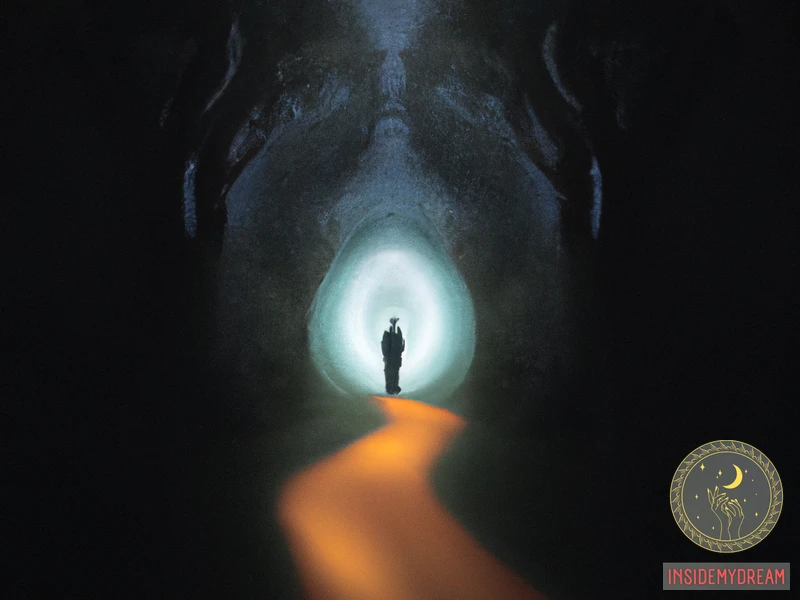Introduction

Dreams have always been a topic of great interest and fascination for humans. While some dreams may seem mundane and forgettable, others leave a lasting impression and make us question their deeper meaning. One such dream theme is the “death game” dream, which can leave us feeling perplexed and unsettled upon waking up. In this article, we will explore the symbolism and significance of a death game dream, and how to interpret it in the context of your own life. Understanding what your subconscious mind is trying to tell you through your dreams can provide valuable insights into your emotions, thoughts, and behaviors.
Why Do We Dream?
To understand the meaning behind a death game dream, it is important to first examine the reasons why we dream in the first place. Dreams are a natural part of our sleep cycle and can occur during any stage of sleep. While the exact purpose of dreaming is still unknown, there are a few theories as to why we experience them.
One theory is that dreams allow us to process and make sense of our emotions and experiences from the day. During REM sleep, our brain processes and consolidates memories, which can lead to dreams that reflect our daily life experiences. Dreams can also help us work through emotional issues that we may not have consciously dealt with.
Another theory suggests that dreams serve as a way for our brains to rehearse important skills or scenarios, helping us to prepare for future challenges or situations. This may explain why we sometimes have dreams about things we are anxious or stressed about, such as giving a presentation or taking a test.
Regardless of the reason, dreams can offer valuable insight into our subconscious and inner thoughts. By examining our dreams and their meanings, we can gain a deeper understanding of ourselves and our emotions.
Table: Reasons Why We Dream
| Theories | Explanation |
|---|---|
| Memory consolidation | Processing and consolidating memories from everyday experiences |
| Emotional processing | Working through emotional issues and stressors |
| Skill rehearsal | Preparing for future challenges or situations |
Dreams can reveal a lot about our subconscious mind and inner thoughts. By paying attention to our dreams and deciphering their meanings, we can better understand ourselves and our emotions. If you’re interested, check out our article about losing consciousness in a dream.
Common Dream Themes
One common dream theme is flying, which is often associated with feelings of freedom, exploration, and independence. Another common dream theme is falling, which can represent a sense of insecurity or fear. Being chased is also a common dream theme that can reflect feelings of anxiety or stress in waking life. Teeth falling out is another common dream theme, which can symbolize a loss of power or confidence. Nudity in dreams can represent feelings of vulnerability or exposure. Being late or missing an important event is a common dream theme that often reflects anxieties about responsibility or the fear of not measuring up. Other common dream themes include being lost, test-taking, and being unprepared.
If you are interested in learning more about common dream themes, check out our articles on dreams of cutting hair short, dreams of being paralyzed, dreams of lions and tigers, dreams of guitars, dreams of wasp nests, dreams of not being able to run, dreams of parakeets, dreams of making out, and dreams of losing a job.
Interpreting a Death Game Dream
As we delve into the depths of our subconscious through our dreams, we sometimes encounter perplexing and unsettling scenarios that leave us feeling confused and searching for answers. If you have recently dreamed of a death game, you may find yourself questioning what this could possibly mean. The intersection of death and games in a dream can be a particularly complex symbol to interpret, as it can be influenced by a variety of personal and cultural associations, as well as emotional states. However, fear not, as we explore the various aspects of your death game dream, we can begin to unravel the complexities and understand the deeper messages that your subconscious is conveying.
Symbolism of Death and Games
When it comes to interpreting a death game dream, it’s important to understand the symbolism behind both death and games. Here are some possible interpretations:
- Death: In dreams, death can symbolize the end of a phase in your life and the beginning of a new one. It can also represent change, transformation, and release from something that no longer serves you. Depending on the context of the dream, death can also represent fear, loss, grief, or sadness.
- Games: Games in dreams can represent competition, playfulness, and a desire for social interaction. They can also indicate a willingness to take risks or a need for excitement in your waking life. In some cases, games can represent a feeling of being trapped or controlled by external forces.
When these two symbols are combined in a death game dream, the interpretation can become complex and nuanced. Here are some possible meanings:
- If you are losing the game and experience death as a result, it could indicate feelings of failure or fear of losing control of a situation.
- If you are winning the game and experience death as a result, it could indicate a fear of success or a need to let go of old habits or ways of thinking in order to move forward.
- If the game is violent or aggressive, it could indicate a need to confront or work through feelings of anger or aggression in your waking life.
- If the game is peaceful or cooperative, it could indicate a desire for connection, teamwork, and harmony in your waking life.
It’s important to remember that the interpretation of a death game dream will depend on your personal associations, emotional state, and the context of the dream itself.
Personal Associations
Personal associations play an important role in understanding the meaning behind a death game dream. This refers to any personal experiences or memories that may be triggered by the symbols and events in the dream. These associations are unique to the dreamer and can provide valuable insights into the subconscious message.
To identify personal associations, it’s important to reflect on any past experiences that may be connected to the symbols in the dream. For example, if the dream features a specific type of game, think about any memories associated with playing that game in real life. It may be helpful to create a table to keep track of these associations, as shown below:
| Symbol | Personal Association |
|---|---|
| Death | Reminds me of my grandmother’s passing |
| Game board | Brings back memories of family game night |
| Competitors | Reminds me of a recent job interview |
These personal associations can add another layer of meaning to the dream. For example, if the dreamer associates death with their grandmother’s passing, it could mean that the dream is related to feelings of grief or loss. Alternatively, if the dreamer associates game boards with positive family memories, it could indicate that the dream represents a desire for more social connection.
Identifying personal associations can help the dreamer gain a deeper understanding of the dream’s meaning and how it relates to their current emotions and experiences.
Emotional States
One key factor to consider when interpreting a death game dream is the emotional state the dreamer was in during the dream. Our subconscious often uses emotions as a way to convey important messages and insight.
Here are some possible emotional states to consider:
- Fear: Feeling fear in a death game dream is a common experience. This may indicate a fear of failure or a fear of losing control in real life. It could also be a sign that the dreamer is feeling overwhelmed or anxious about a situation.
- Excitement: Some people may feel excited during a death game dream. This could indicate a sense of thrill or adventure in their waking life. However, it’s important to consider the context and outcome of the dream. If the dream ends in a negative way, it may signify a warning to be cautious.
- Anger: Feeling angry in a death game dream could represent repressed anger or frustration in waking life. It could also be a sign that the dreamer feels like they’re in a situation where they’re being unfairly targeted or challenged.
- Confusion: Dreaming of a death game can be a confusing experience, which may suggest that the dreamer is feeling uncertain or unsure of their direction in waking life. The dream could be a message to take some time to reflect on their goals and priorities.
- Sadness: Feeling sad during a death game dream could represent a sense of loss or grief in real life. Alternatively, it could indicate a feeling of hopelessness or powerlessness during a difficult situation. The dream may be a way for the subconscious to process these emotions.
It’s important to note that emotions are complex and multi-faceted. The emotional state described in a death game dream could be influenced by a wide range of factors, such as current life events, past experiences, and personal beliefs. Taking the time to reflect on one’s emotions and how they relate to the dream can help provide valuable insight into the message that the subconscious is trying to convey.
Related Dreams and Meanings

As we explore the mysterious world of dreams, it becomes apparent that there are countless variations and interpretations of the symbols and scenarios that we encounter in our subconscious. It is not uncommon for individuals to experience related dreams that seem to be connected in some way, whether by theme or imagery. These dreams can offer insight into deeper meanings that are hidden just beneath the surface. Let’s delve into some related dreams and explore the possible meanings hidden within.
Death Dreams
When it comes to dreams about death, they can often be alarming and unsettling. However, it’s important to keep in mind that they are often symbolic and not literal. Dreaming about death can represent a variety of things such as the end of a specific aspect of your life, the fear of the unknown or even personal transformation. In order to better understand these dreams, it’s helpful to analyze the different factors of the dream and your personal associations to them.
One key aspect to consider is the type of death that is occurring in the dream. Is it a natural death, an accident, or a violent death? This can give insight into what specifically is ending or transforming in your life. Additionally, who is dying in the dream can also be important. Is it someone you know personally, or a stranger? This can represent different aspects of yourself or your relationships.
Another important factor is your emotions during the dream and immediately after waking up. Were you scared, sad, relieved, or indifferent? Your emotional state can reflect how you feel about the change or transformation represented in the dream.
It’s worth noting that death dreams can also be a reflection of your subconscious fears and anxieties. Everyone has their own unique associations with death, so it’s important to reflect on your personal beliefs and what death means to you. This can give insight into the specific meaning of the dream for you personally.
Here’s a table summarizing some common interpretations of death dreams:
| Type of Death | Interpretation |
|---|---|
| Natural Death | End of a specific aspect of your life |
| Accidental Death | Unexpected changes, loss of control |
| Violent Death | Deep-seated fears, emotional turbulence |
In order to interpret a death dream, it’s important to analyze the various factors at play such as the type of death, who is dying, your emotional state, and your personal associations with death. By doing so, you can gain a better understanding of what your subconscious is trying to tell you.
Game Dreams
Dreams about games can be interpreted in a number of ways, depending on the type of game being played. Here are some common game dreams and their meanings:
| Dream | Meaning |
|---|---|
| Playing a Board Game | Playing a board game in your dream may signify a desire for competition or the need for structured rules in your life. |
| Playing a Video Game | Playing a video game in your dream could suggest an escape from reality, or a desire to be in control of a situation. |
| Winning a Game | Winning a game in your dream may indicate feelings of success and accomplishment in your waking life. |
| Losing a Game | Losing a game in your dream could signify feelings of failure or disappointment, or a fear of not measuring up to expectations. |
| Trying to Cheat in a Game | Attempting to cheat in a game in your dream may symbolize a lack of confidence in your abilities or a sense of dishonesty in your actions. |
| Watching Others Play a Game | Observing others playing a game in your dream could mean that you feel left out or excluded from certain activities or social groups. |
It’s important to note that the interpretation of game dreams can vary depending on the individual’s personal associations and emotional states. Keeping a dream journal and reflecting on your thoughts and emotions can help you gain a deeper understanding of your own dream symbolism. If you are unsure about the interpretation of your dreams, seeking professional help from a therapist or dream analyst can also be beneficial.
Tips for Understanding Your Dreams
As fascinating as it is to try and decipher the meanings behind our dreams, it can be a difficult task to undertake without proper guidance. However, with a few tips and tricks, you can start to unravel the messages your subconscious is trying to send you. Below are some strategies you can use to better understand your dreams and connect with your inner self.
Keep a Dream Journal
One crucial tip for understanding your dreams is to keep a dream journal. Writing down your dreams as soon as you wake up can help capture the details and feelings you experienced during the dream. This can make it easier to reflect on the dream later and determine what it might mean.
Here are some reasons why keeping a dream journal is beneficial:
| Reason | Explanation |
| Helps with memory retention | Writing down your dreams helps to solidify them in your memory, making it easier to recall details later on. |
| Allows for reflection | Reviewing your dream journal regularly can help you identify patterns and recurring themes in your dreams. |
| Helps with interpretation | Keeping a record of your dreams over time can provide insight into recurring symbols and their possible meanings. |
| Encourages self-awareness | Dreams can reveal hidden thoughts and emotions. Recording them in a journal can help you become more self-aware and in tune with your subconscious. |
Remember to write in your dream journal as soon as you wake up, even if it’s just a few key words to jog your memory later. Try to be as detailed as possible, including any emotions you felt during the dream. Over time, you may begin to see patterns and themes emerge, helping you uncover what your subconscious is trying to tell you through your dreams.
Reflect on Your Thoughts and Emotions
One of the most important steps to understanding your dreams is to reflect on your thoughts and emotions. When you wake up from a death game dream, take a few moments to sit with your feelings and think about what may have triggered the dream.
Here are some questions you can ask yourself as you reflect:
| Question | Explanation |
| What was I feeling during the dream? | Identifying the emotions you felt in the dream can give you clues about your subconscious thoughts and feelings. Were you anxious, scared, intrigued, or something else? |
| What was the game in the dream? | Take note of the specific details of the game. Was it a board game, a video game, a card game? Was it a game you’re familiar with, or something completely new? |
| Who were the other players in the game? | Were they people you know in real life, or strangers? Did they seem hostile, friendly, or neutral? |
| What was the outcome of the game? | Did you win or lose? Was there a clear winner at all? Paying attention to the conclusion of the dream can give you insight into your subconscious desires and fears. |
Reflecting on your thoughts and emotions is a key component of dream analysis. By examining the specific details and nuances of your death game dream, you may be able to unpack some of the hidden meanings and messages from your subconscious. Remember to approach your reflections with an open mind and a willingness to explore the unknown.
Seek Professional Help if Needed
It is important to remember that dreams can often be a reflection of our subconscious thoughts and emotions, but they can also be influenced by external factors such as stress and anxiety. If you find that your dreams are causing you distress or interfering with your daily life, it may be beneficial to seek professional help.
Who should consider seeking professional help?
Anyone who experiences frequent nightmares or dreams that cause anxiety or fear should consider seeking professional help. Additionally, those who have experienced traumatic events or suffer from anxiety or depression may find it beneficial to speak with a therapist or counselor about their dreams.
What kind of professional help is available?
There are a variety of professionals who may be able to help with dream interpretation and management, including therapists, counselors and psychologists. It is important to choose a professional who has experience in dream analysis and is able to provide you with the support and guidance you need.
What can you expect from professional help?
When seeking professional help for dream analysis and management, you can expect to engage in talk therapy sessions with a qualified professional. During these sessions, you will have the opportunity to discuss your dreams in detail, explore the underlying emotions and thoughts, and develop strategies for managing any distress they may cause.
How can seeking professional help benefit you?
Seeking professional help for dream analysis and management can be beneficial in a number of ways. Talking through your dreams in a safe and supportive environment can help you gain insight into your own thoughts and emotions and develop coping strategies for managing any distressing dreams. Additionally, it can also provide a space for you to process any underlying trauma or emotional difficulties that may be influencing your dreams.
Seeking professional help for dream analysis and management can be an effective way to gain insight into your subconscious thoughts and emotions and develop strategies for managing any distressing dreams. If you feel that your dreams are negatively impacting your daily life, don’t hesitate to reach out to a qualified professional for support and guidance.
Conclusion
In conclusion, dreams can offer valuable insights into our subconscious mind and can serve as powerful tools for self-discovery. While death game dreams can be unnerving and confusing, they may hold valuable information about our current emotional and psychological state.
It is important to remember that dream interpretation is not an exact science and that the meanings of dreams can vary from person to person. However, by examining the symbolism and personal associations within the dream, as well as reflecting on our current emotional state, we can begin to understand what our subconscious is trying to tell us.
One tip for better understanding our dreams is to keep a dream journal, recording our dreams and any thoughts or emotions that come up while reflecting on them. This can help us identify patterns or recurring themes within our dreams, as well as any changes or shifts in our emotions and thoughts over time.
If we find ourselves struggling to interpret our dreams or feel overwhelmed by their content, seeking the help of a professional therapist or dream analyst may be beneficial. They can offer perspective and guidance in understanding the deeper meanings of our dreams and how they relate to our lives.
Overall, death game dreams may be unsettling, but they can offer valuable insights into our subconscious mind and emotions. By taking the time to reflect and interpret our dreams, we can uncover hidden truths about ourselves and our current emotional state, leading to greater self-awareness and growth.
Frequently Asked Questions
What does it mean to dream of a death game?
Dreaming of a death game can symbolize the struggle of dealing with intense emotions or situations in your waking life.
Is dreaming about death games common?
Death game dreams are not as common as other dream themes, but they can occur in times of high stress or emotional turmoil.
Do death game dreams always mean something negative?
Not necessarily. While death and games can be negative symbols, they can also represent growth, change, and overcoming obstacles in your life.
Why is it important to reflect on personal associations in death game dreams?
Personal associations can provide insight into how your subconscious is interpreting the symbols in your dream, giving you a better understanding of your thoughts and emotions.
Should I be worried about having a death game dream?
Not necessarily. Dreams often reflect our inner thoughts and emotions, so it’s important to reflect on what the dream may be trying to tell you.
Can game dreams have different meanings than death game dreams?
Absolutely. Game dreams can have a variety of meanings, such as competitiveness, strategy, or fun, depending on the context of the dream and your personal associations.
What should I do if I’m struggling to understand the meaning of my dream?
Consider seeking professional help from a therapist or dream interpreter who can provide additional insight and guidance.
How can keeping a dream journal help me understand my dreams?
A dream journal allows you to record the details of your dreams and reflect on the thoughts and emotions they may be revealing, providing a deeper understanding of your subconscious.
Why is it important to reflect on your emotions in relation to your dream?
Emotions in a dream can reveal how we are processing and coping with specific situations or challenges in our waking life, giving us insight into areas we may need to address.
Can dreams really provide insight into our subconscious?
Yes, dreams have been studied for centuries and are widely believed to reflect our subconscious thoughts, emotions, and desires.









